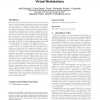Free Online Productivity Tools
i2Speak
i2Symbol
i2OCR
iTex2Img
iWeb2Print
iWeb2Shot
i2Type
iPdf2Split
iPdf2Merge
i2Bopomofo
i2Arabic
i2Style
i2Image
i2PDF
iLatex2Rtf
Sci2ools
120
click to vote
HPDC
2008
IEEE
2008
IEEE
Improving peer connectivity in wide-area overlays of virtual workstations
Self-configuring virtual networks rely on structured P2P routing to provide seamless connectivity among nodes through overlay routing of virtual IP packets, support decentralized hole-punching to establish bi-directional communication links among nodes behind network address translators, and dynamic configuration of virtual IP addresses. Our experiences with deployments of virtual networks in support of wide-area overlays of virtual workstations (WOWs) reveal that connectivity constraints imposed by symmetric NATs and by Internet route outages often hinder P2P overlay structure maintenance and routability, subsequently limiting the ability of WOWs to deliver high-throughput computing through aggregation of resources in different domains. In this paper, we describe and evaluate two novel approaches which are generally applicable and fully decentralized, and show that they improve routability of structured P2P networks in such connectivity constrained environments: (1) a fault-tolera...
| Added | 29 May 2010 |
| Updated | 29 May 2010 |
| Type | Conference |
| Year | 2008 |
| Where | HPDC |
| Authors | Arijit Ganguly, P. Oscar Boykin, David Wolinsky, Renato J. O. Figueiredo |
Comments (0)

